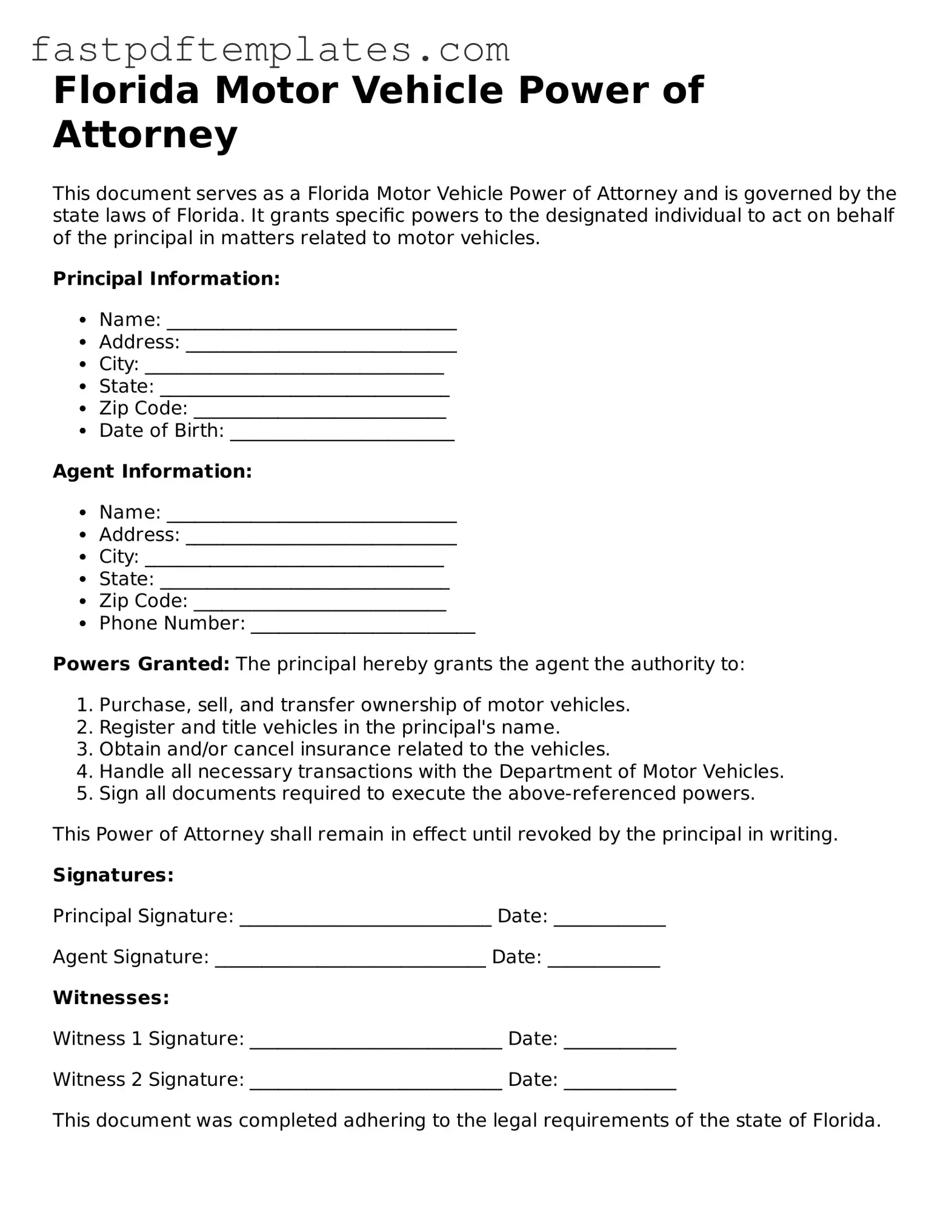The Florida Motor Vehicle Power of Attorney form is similar to the General Power of Attorney. Both documents allow individuals to designate someone else to act on their behalf. In the case of a General Power of Attorney, the authority granted can cover a wide range of matters, including financial and legal decisions. However, the Motor Vehicle Power of Attorney is specifically tailored for matters related to motor vehicles, such as registering, selling, or transferring ownership of a vehicle.
Another document that shares similarities is the Durable Power of Attorney. This type of power of attorney remains effective even if the principal becomes incapacitated. Like the Motor Vehicle Power of Attorney, it allows for the delegation of authority to another person. However, the Durable Power of Attorney can cover a broader scope of decisions, whereas the Motor Vehicle version is limited to vehicle-related matters.
The Limited Power of Attorney is also comparable to the Florida Motor Vehicle Power of Attorney. This document grants authority for specific tasks or transactions, similar to how the Motor Vehicle Power of Attorney is used solely for vehicle-related issues. The Limited Power of Attorney can be customized for various purposes, making it versatile, while the Motor Vehicle version is focused on automotive transactions.
The Medical Power of Attorney is another relevant document. This form allows individuals to appoint someone to make healthcare decisions on their behalf if they are unable to do so. Although it pertains to medical decisions rather than vehicle matters, both documents involve the appointment of an agent to act in the principal's best interest, emphasizing the importance of trust in the relationship.
The Real Estate Power of Attorney is similar in that it allows an individual to designate someone to handle real estate transactions. While the Motor Vehicle Power of Attorney focuses on vehicle-related issues, both documents empower an agent to manage significant assets on behalf of the principal, ensuring that important decisions can be made even in the principal's absence.
The Financial Power of Attorney also bears resemblance to the Florida Motor Vehicle Power of Attorney. This document enables a person to manage financial matters on behalf of another individual. While the Financial Power of Attorney can encompass a wide range of financial decisions, the Motor Vehicle version is specifically focused on actions related to motor vehicles, highlighting the specialized nature of the latter.
The Special Power of Attorney is another document that is akin to the Motor Vehicle Power of Attorney. This form allows individuals to grant authority for a specific purpose or transaction, similar to how the Motor Vehicle version is limited to automotive matters. Both documents ensure that the designated agent can act within the defined scope of authority granted by the principal.
The Consent to Release Information form also parallels the Motor Vehicle Power of Attorney. This document allows individuals to authorize the release of specific information to designated parties. While the Motor Vehicle Power of Attorney enables an agent to act on behalf of the principal in vehicle-related matters, the Consent to Release Information form focuses on the sharing of information, demonstrating the importance of clear communication in various contexts.
Lastly, the Vehicle Title Transfer form is similar in that it is often used in conjunction with the Motor Vehicle Power of Attorney. This form facilitates the transfer of ownership of a vehicle from one party to another. While the Motor Vehicle Power of Attorney grants the authority to complete this process, the Vehicle Title Transfer form is the official document that records the change of ownership, illustrating the procedural aspects involved in vehicle transactions.

